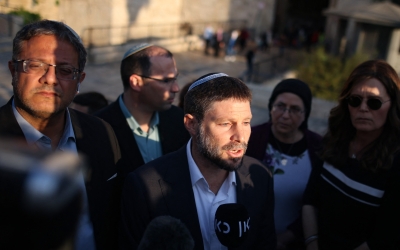Israel elections: Far-right victory a ‘crisis for British Jews’

The triumph in Israeli elections of a far-right coalition led by Benjamin Netanyahu alongside an alliance of ultra-Orthodox and ultra-nationalist parties has divided opinion in British-Jewish communities.
Nothing exemplifies the division more so than the reaction of Britain's two leading Jewish newspapers, Jewish News and the Jewish Chronicle.
In an editorial following Tuesday's elections, in which Netanyahu's alliance won 64 seats in the 120-seat parliament, or Knesset, the Jewish Chronicle warned that it was not for British Jews to judge how Israelis vote in their elections.
"It is not for us to demand how Israelis vote or to make pre-conditions on our support for Israel," said the editorial.
New MEE newsletter: Jerusalem Dispatch
Sign up to get the latest insights and analysis on Israel-Palestine, alongside Turkey Unpacked and other MEE newsletters
This is despite the paper calling out Netanyahu's key allies, Itamar Ben-Givir and Belazel Smotrich, for holding "extreme views that rightly repel even the most ardent supporters of Israel".
'The Israeli right, overnight, has gone from being pro-Netanyahu, settlers, and security to pro-racism and homophobia'
- Richard Ferrer, Jewish News editor
The caveated response by the newspaper towards the rise of far-right parties in Israel stood in stark contrast to the reaction of Jewish News.
The newspaper's front page editorial on Thursday described the election results as confirming "our worst fears".
"Never in the Jewish state's history has hatred wielded such power," the paper said.
It warned: "Over the coming months we will likely see Israel do things that, if it were any other country, we would condemn without hesitation."
Richard Ferrer, the editor of Jewish News, told Middle East Eye he feared the rapid transformation of the Israeli right could have potentially dramatic consequences for the country.
"The Israeli right, overnight, has gone from being pro-Netanyahu, settlers, and security, to pro-racism and homophobia," said Ferrer.
"Within days, a man who cheered the murder of Yitzhak Rabin will likely be security minister [Itamar Ben-Gvir] and a man [Belazel Smotrich] who wants to outlaw Arabs, head of defence," said Ferrer, referring to Ben-Gvir's hostility towards the former Israeli prime minister killed in 1995 by a Jewish far-right activist, and Smotrich's stated desire to become defence minister.
Rabin was murdered in retaliation for signing a peace agreement in 1993 with Yasser Arafat, the then chairman of the Palestine Liberation Organisation.
"I've long feared a Jewish state might be morally altered by the neighbourhood - surrounded as it is by intolerant, amoral states," said Ferrer.
But the domestic political changes that Israeli society is going through could pose a significant risk to the country and its relationship with the diaspora.
'Line in the sand'
A 2015 study titled The Attitudes of British Jews Towards Israel revealed that while many British Jews were strongly attached to Israel, they also had strong reservations towards certain policies they felt undermined prospects of peace with the Palestinians and the security of Israel.
On settlements, 75 percent of respondents viewed their expansion as a "major obstacle to peace", and more than 70 percent viewed a two-state solution as the only path to peace. In addition, more than 68 percent expressed "despair" every time Israeli governments announced new settlements in the occupied Palestinian territories.
The study also found that around a quarter of British Jews were willing to support some sanctions towards Israel if it meant the Israeli government would negotiate with the Palestinians.
An Israeli government composed of Netanyahu, Ben-Gvir and Smotrich would sharply contrast with the views of the vast majority of British Jews.
Ben-Gvir, who lives in the illegal settlement of Kiryat Arba in the Palestinian city of Hebron, has called for the wholesale deportation of Palestinians from their homeland and those not seen as loyal enough to Israel.
"The response from UK Jews is roughly a 60-40 split in favour of those sickened by Israel's direction of travel," said Ferrer.
"The 40 percent, a shockingly significant number, are determined to unquestionably support anything in Israel's name, including bigotry and intolerance," Ferrer said, adding that for the 60 percent, they have "reached a line in the sand. That line is where hatred begins."
Divided community
Starkly different approaches have also marked the reaction among organisations representing Jewish communities in the UK.
In a statement on Thursday following confirmation of official results, the Board of Deputies of British Jews (BoD), one of the country's oldest bodies seeking to speak for the community, congratulated Netanyahu, and said British Jews were "deeply committed to Israel".
But, without referencing Netanyahu's far-right coalition allies by name, it added: "We are gravely concerned that the potential government will likely include individuals whose stated views and actions are in contrast to the tolerant and inclusive values of our community."
'Our Jewish community has strong ties to Israel and a long history of engaging with the Jewish state. But this is no longer business as usual, and this is a crisis for British Jews'
- Yachad, UK Jewish peace group
The statement reflects discussions within British-Jewish communities on how to receive the upcoming government, according to many of those spoken to by MEE.
Earlier this year, when Smotrich, the leader of the far-right Religious Zionism alliance, which now has 14 seats in the Knesset, visited the UK, the BoD took a strong line against him.
Tweeting in Hebrew at the time, the BoD said: "We reject his abominable views and the hatred ideology of Bezalel Smotrich and call on all members of the British Jewish community to show him the door."
MEE asked the BoD whether it still stood by that statement and whether it would boycott Smotrich or Ben-Gvir if they were to visit the UK, but had received no response at the time of publication.
Reflecting the divided response within Jewish communities, Yachad, which describes itself as "the pro-Israel, pro-peace movement for British Jews", spoke out unequivocally against the dangers posed by the far-right victory.
Smotrich's Religious Zionist party, Yachad said, stands for "Jewish supremacy, segregation, anti-Palestinian racism as well as anti-LGBTQ rights and an opposition to reform and liberal Judaism".
"Our Jewish community has strong ties to Israel and a long history of engaging with the Jewish state in many ways. But this is no longer business as usual, and this is a crisis for British Jews," it added.
"We have a duty to speak out loud and clear against racism, incitement and hatred and be clear that we will not unequivocally support an Israel that does not stand for the same values as our community does."
'Appearance of unity'
The strong and very public discussion playing out in British-Jewish communities has also taken some by surprise.
"Generally, these institutions greatly value the outward appearance of unity," said a Jewish anti-Zionist activist associated with Jewdas, a diaspora group known for its left-wing politics.
"The British Jewish community doesn't like to air its internal disputes in public," the Jewdas organiser, who asked to remain anonymous, told MEE.
While Israeli politics has drifted to the right over many years, the dramatic rise of Ben-Gvir and Smotrich has pushed some to express their strong opposition publicly.
"The change is that Jewish News and the more liberal Zionist aspects are publicly calling a part of the incoming Israeli governing coalition 'fascist', inviting a big public rift," said the Jewdas organiser.
Radical politicians in Israel have existed for decades without inviting the same public opprobrium, while privately strong reactions have been shared within British-Jewish communities.
But the Jewdas organiser saw another factor influencing the reaction of some in the UK: "I would wager that it's because Ben-Gvir and Smotrich are explicitly opposed to things which directly affect that constituency within the British Jewish communities.
"They are explicitly against the rights, and the very identification, of non-Orthodox Jews, for instance, which, if you're a Zionist reform Jew in Britain, is a real problem for you."
These discussions also highlight another aspect of the ongoing conversation within communities, according to the Jewdas organiser.
There is a growing and more vocal split between liberal Zionists, particularly among the younger generation, who oppose the far-right turn in Israeli politics, and, on the other hand, more staunch Zionists who are supportive of it.
A third group within British-Jewish communities are opposed to criticising the Israeli government, but concerned about this turn in the country's politics.
Organisations like the BoD are "more comfortable criticising elements of Israeli politics that they find objectionable than the government itself - which they feel the need to defend at all times if it does not antagonise liberal Zionist interests, like banning egalitarian prayer spaces at the Western Wall," added the Jewdas organiser.
If figures like Ben-Gvir and Smotrich tone down some of their rhetoric against Zionist reform Jews, some "UK liberal voices will tone down their rhetoric," said the activist.
Another British-Jewish activist, who wished to remain anonymous because their organisation is still working on a common approach towards the new Israeli government, warned that Jewish people and organisations seem to be "rethinking" how they want to engage with Israel on a political level.
The ongoing discussion is not about whether to be pro- or anti-Israel, the anonymous source told MEE, but about a divergence of values between those set to form the Israeli government and liberal Jews, in Israel and the diaspora, on issues such as LGBTQ rights.
In these circumstances, the source said, discussion will likely focus on "critical engagement and uplifting the voices of those who are about to be pushed to the sidelines".
"So even if BoD doesn't talk about Palestine, they allege to support anti-racist values and represent all Jews. The Israeli government doesn't. So now what?"
Middle East Eye delivers independent and unrivalled coverage and analysis of the Middle East, North Africa and beyond. To learn more about republishing this content and the associated fees, please fill out this form. More about MEE can be found here.






